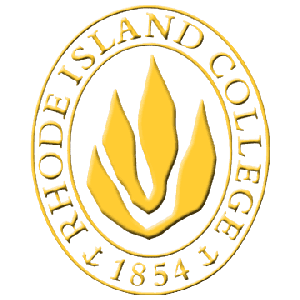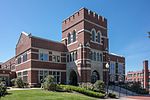
Brown University is a private Ivy League research university in Providence, Rhode Island, United States. It is the seventh-oldest institution of higher education in the US, founded in 1764 as the College in the English Colony of Rhode Island and Providence Plantations. One of nine colonial colleges chartered before the American Revolution, it was the first US college to codify that admission and instruction of students was to be equal regardless of the religious affiliation of students.

Rhode Island College (RIC) is a public college in Rhode Island, United States, with much of the land in Providence, and other parts in North Providence. The college was established in 1854 as the Rhode Island State Normal School, making it the second-oldest institution of higher education in Rhode Island after Brown University. Located on a 180-acre (73 ha) campus, the college has a student body of 9,000: 7,518 undergraduates and 1,482 graduate students. RIC is a member of the NCAA and has 17 Division III teams.
The Carnegie Classification of Institutions of Higher Education, or simply the Carnegie Classification, is a framework for classifying colleges and universities in the United States. It was created in 1970 by the Carnegie Foundation for the Advancement of Teaching. It is managed by the American Council on Education.

The Rhode Island School of Design is a private art and design school in Providence, Rhode Island. The school was founded as a coeducational institution in 1877 by Helen Adelia Rowe Metcalf, who sought to increase the accessibility of design education to women. Today, RISD offers bachelor's and master's degree programs across 19 majors and enrolls approximately 2,000 undergraduate and 500 graduate students. The Rhode Island School of Design Museum—which houses the school's art and design collections—is one of the largest college art museums in the United States.
Katharine Gibbs College was a for-profit institution of higher learning based in the United States of America, founded by Katharine Gibbs.
Northpoint Bible College and Seminary is a private Pentecostal Bible college and seminary in Haverhill, Massachusetts. The college's sole purpose is to teach and train students for Pentecostal ministry for the spread of the Christian gospel. It offers undergraduate and graduate degrees in Biblical Studies and Practical Theology.

A Hispanic-serving institution (HSI) is defined in U.S. federal law as an accredited, degree-granting, public or private nonprofit institution of higher education with 25% or higher total undergraduate Hispanic or Latino full-time equivalent (FTE) student enrollment. In the 2021–22 academic year, 572 institutions met the federal criteria, up from 539 institutions in the 2018–19 academic year.

College Hill is a historic neighborhood of Providence, Rhode Island, and one of six neighborhoods comprising the city's East Side. It is roughly bounded by South and North Main Street to the west, Power Street to the south, Governor Street and Arlington Avenue to the east and Olney Street to the north. The neighborhood's primary commercial area extends along Thayer Street, a strip frequented by students in the Providence area.
The Integrated Postsecondary Education Data System (IPEDS) is a system of interrelated surveys conducted annually by the National Center for Education Statistics (NCES), a part of the Institute for Education Sciences within the United States Department of Education. IPEDS consists of twelve interrelated survey components that are collected over three collection periods each year as described in the Data Collection and Dissemination Cycle. The completion of all IPEDS surveys is mandatory for all institutions that participate in, or are applicants for participation in, any federal financial assistance program authorized by Title IV of the Higher Education Act of 1965, as amended.

The University of Rhode Island (URI) is a public land-grant research university with its main campus in Kingston, Rhode Island, United States. It is the flagship public research as well as the land-grant university of Rhode Island. The university is classified among "R2: Doctoral Universities – High research activity". As of 2019, the URI enrolled 14,653 undergraduate students, 1,982 graduate students, and 1,339 non-degree students, making it the largest university in the state.

The history of Brown University spans 260 years. Founded in 1764 as the College in the English Colony of Rhode Island and Providence Plantations, Brown is the seventh-oldest institution of higher education in the United States and the third-oldest institution of higher education in New England. At its foundation, the university was the first in the U.S. to accept students regardless of their religious affiliation. Brown's medical program is the third-oldest in New England while its engineering program is the oldest in the Ivy League.
The College of Brown University is the undergraduate school of Brown University, in College Hill, Providence, Rhode Island. Founded in 1764, the College is the university's oldest school and the seventh-oldest institution of higher education in the United States.

Helen Adelia Metcalf was a founder and director of the Rhode Island School of Design (RISD) in Providence, Rhode Island.




















